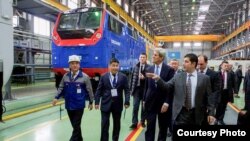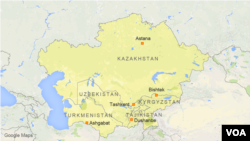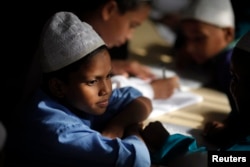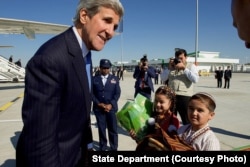U.S. Secretary of State John Kerry just returned from a whirlwind trip to five Central Asian countries with "a deepening commitment" to collaborate on building the region’s economy, fighting international terrorist organizations and combating climate change, as top diplomats professed in a joint statement.
Kerry’s four-day visit briefly focused attention on the former Soviet nations of Kazakhstan, Kyrgyzstan, Tajikistan, Turkmenistan and Uzbekistan. The trip, which ended Tuesday, was intended to reassure them of America’s continued support, despite the U.S. military drawdown in Afghanistan and subsequent spending reductions in the region.
"Certainly, the United States of America is aware that security and stability in Central Asia is an important building block for global security," Kerry told students at Nazarbayev University in Kazakhstan’s capital, Astana, in a speech Monday. With neighbors including "Russia, Iran, Afghanistan and China ... you sit at the connection of some of the most significant foreign policy and security challenges anywhere on the planet."
Several experts pressed for sustained attention on the region, laying out concerns going forward, especially around religious extremism and the economy.
Soviet era
Kathleen Kuehnast, senior gender adviser at the congressionally funded, independent United States Institute of Peace, said policymakers hoping to challenge violent extremism should understand fault lines involving population distribution, age and religion.
A sociocultural anthropologist, she researched the Soviet Union’s approach to gender equality for her doctoral dissertation in the early 1990s. In 70 years of communist rule, the Soviets built a strong education system that reached well into remote areas. "The entire Central Asia region was well educated," with one of the world’s best-schooled Muslim female populations, Kuehnast said. Russian language and culture became embedded among the educated.
When the Soviet Union collapsed in 1991, some of the academic structure did, too. Since then, "the rural population has not had the same [educational] advantages that their parents’ generation did," Kuehnast said.
Much of the region’s population remains rural, ranging from almost half (47 percent) in Kazakhstan to almost two-thirds (64 percent) in Uzbekistan and mountainous Kyrgystan, according to the CIA World Factbook.
Religious divide
Kuehnast also is focused on the secular/religious split. The entire region had been "Islamicized" by the late 1800s, she said, but because religion was outlawed under communist rule, Soviet bloc "citizens couldn’t experiment with religion in a free and open fashion" for much of that time.
Unfamiliarity with religion has left fertile ground for the possibility of conservative Islamic and evangelical ideologies to take root, feeding curiosity among the young and suspicion among older generations with more secular views, Kuehnast explained.
She helped poll several dozen university students last year in Kyrgyzstan as part of a study on how to prevent violent extremism. She recalled a 19-year-old’s "profoundly astute" observation that because he and his peers "were not raised in any kind of religious framework, we don’t know what is normal or what is extremist…. Of course we’re curious about religious practices, because it was forbidden."
Kuehnast’s organization encourages wider academic instruction among its recommended counterweights to extremism.
So does Sanam Naraghi-Anderlini, co-founder and executive director of the International Civil Society Action Network (ICAN), a Washington-based nonprofit organization that promotes women’s rights, peace and security.
ICAN's partners in Tajikistan last year "were saying we need religious education in our curricula," Anderlini said, calling for a broad survey of faith traditions and their principles.
She wrote recently about a worrisome rise of Pakistani all-female madrasas that promote "one-sided religious teachings." They prepare girls "to be ideal mothers and transmit conservative beliefs to their offspring,” emphasizing subservience to male relatives and restricting them to home life. Some extremist factions recognize a militant role for women, too.
Graduates of these madrasas are opening their own schools, spreading the narrow views and, in an ironic twist, giving the instructors a rare source of personal freedom and income, Anderlini said. "Here we’re saying it’s important to economically empower women, and guess who’s doing it?"
She said her group’s Tajik colleagues are trying to ward off such developments in their country.
The heightened threat of terrorism warrants more open discussion and activism, not less, Anderlini said, but it’s “being used as an excuse to shut down civil society space.”
Tajikistan’s government, for instance, last year sustained "a crackdown on freedom of expression and political opposition and pressure on the independent media," Human Rights Watch concluded on its website. The country "continued to enforce serious restrictions on religious practice...."
By "using counterterrorism as an excuse, you’re losing out on your moderating forces," Anderlini said. She added, "The more securitized your response, the greater the backlash."
For an example of moderating forces, Anderlini points to civil society activists in war-torn Syria. "The Syrians have been doing youth programs for 14- to 18-year-olds, teaching them tolerance" in what she describes as the equivalent of "a vaccination."
ICAN, with some other civil society groups, is pressing to ensure that women have a voice in political and security issues – including in Central Asia.
Human rights
Human Rights Watch has cited violations, from suppression of free speech to the torture of dissidents, with the region's authoritarian governments among the perpetrators. It describes Turkmenistan, for instance, as "one of the most repressive and closed countries in the world. The country is virtually closed to independent scrutiny, media and religious freedoms are subject to draconian restrictions, and human rights defenders and other activists face the constant threat of government reprisal."
Kerry acknowledged human rights challenges in his remarks to the university students. Accountable governance, he said, is "measured by the independence of a judiciary; by the health of the civil society; by the ability of every individual to enjoy basic freedoms of thought, speech, and religion, and to engage in political expression of political views….”
Some analysts faulted Kerry, saying he could have been more pointed, publicly, about U.S. opposition to repression.
"He kept his remarks very diplomatic and didn’t confront these leaders on their human rights messages in public, which I think is somewhat of a shame,” said Paul Stronski, a senior associate at the Carnegie Endowment for International Peace and, from 2012 to 2014, the U.S. National Security Council’s director for Russia and Central Asia. "... I do think that this is a time when the United States could talk about human rights a little bit more simply because the U.S. does not need these [countries] as much as the U.S. used to” for conducting operations in Afghanistan.
Kerry, speaking at the university, said the U.S. government is "working every single day to engage states, civic organizations, NGOs, faith-based religious organizations, all in the fight against violent extremism.”
For instance, Kerry said, the U.S. is helping to strengthen border patrols and security in Kazakhstan, Tajikistan and Turkmenistan; promoting language and vocational training for madrasa students in Kyrgyzstan; improving economic opportunities and food security where extremism threatens in Tajikistan; and calling for "a global effort to rebut the propaganda and lies that are spread by terrorist groups" in Uzbekistan.
Flagging economy
Over breakfast on Monday, Kerry met with select members of the American Chamber of Commerce in Kazakhstan to encourage economic diversification and foreign investment in the region.
Kazakhstan has "been making a very sincere effort to diversify" in the last five years, Doris Bradbury, the chamber’s executive director, told VOA in a phone interview. But "when you have an oil-fueled economy, it’s sometimes slow going to develop other parts."
Complicating the matter is that Kazakhstan’s oilfields largely lie in the hands of oligarchs, with minimal government intervention, the Institute of Peace reports. China’s falling demand for oil and Russia’s sanctions-induced spending cutbacks are squeezing Kazakhstan’s revenues. Its government, which had tightly controlled its currency, the tenge, decided in late August to let it float.
"It’s been volatile ever since then. It has caught everyone unawares – not only investors but the [general] population," Bradbury said.
But the country’s finance minister attends the chamber’s monthly meetings, signaling strong support for business, she added.
"The investment climate in Kazakhstan is interesting,” said Bradbury, whose chamber members represent domestic and foreign firms dealing in technology, financial services, consumer goods and more. “… It’s still a developing country – and it’s thriving and it’s certainly a leader among other countries – but it’s still a former Soviet country.”
And "part of the Soviet hangover is that the judges feel they still need to side with the government…. So it’s difficult for investors to have a fair hearing” on issues such as taxation, franchising or customs, Bradbury said. "… But, that being said, we don’t see companies leaving Kazakhstan."
Both the chamber and U.S. government are pushing for judicial reform.
Consistent message
Evan Feigenbaum, vice chairman of the Chicago-based Paulson Institute and a former deputy assistant secretary of state for Central Asia, said Kerry’s trip upholds a U.S. message to Central Asia that "has been pretty consistent" since the early 1990s.
"It’s that the U.S. is trying to support the independence and sovereignty of the countries by giving them choices, options and opportunities, including through relationships with Europe and the United States," on security, economics, human rights and politics, he said, calling the regional integration agenda “a good thing."
Feigenbaum estimated the U.S. has provided $8.9 billion to Central Asia since the Soviet collapse, a figure dwarfed by “the eye-popping sums of money that China is throwing at the region” to finance large-scale infrastructure projects.
While "Moscow obviously has very close relationships with governments in Central Asia," he said, “what I’ve been most struck by is how, as China has become a larger and larger factor in the economics space, the Russian role in the economics space has appeared to recede.”
Overall, “the story in Central Asia is really much more about Russia and China, and the United States as a peripheral player there,” Feigenbaum said.
But he endorses the renewed U.S. commitment to the region.
“Even if Central Asia is not the No. 1 priority ... it is an intersection point” – on questions of extremism and terrorism, Russia, China, Iran, post-drawdown Afghanistan – "for the U.S. as a global player that wants to be active in every part of the world."
Alexei Pimenov of VOA's Russian service contributed to this report.









